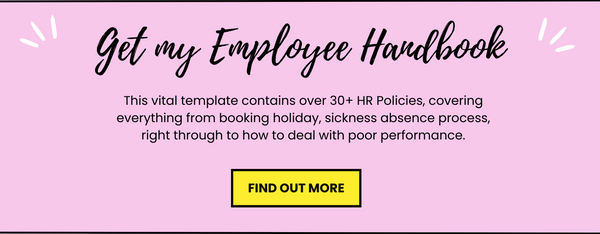My employee's gonna be a dad! What are my responsibilities as their employer?

If you’re asking this question, it sounds like you’re already an ace employer! 🏆
Yep, there are things you must do by law. But, this is also a brilliant opportunity to support your employee through a massively, life-changing experience. And in turn, cultivate deeper levels of loyalty and engagement from them.
Before we talk about your responsibilities, it's important to note that Paternity Leave is no longer just for men. It is for one of the people within any couple, whether heterosexual or same-sex and whether married, in a civil partnership or co-habiting. And with the introduction of Shared Parental Leave (SPL) in 2015 – you need to get ready for a world where equal responsibility for childcare is something we don’t blink twice at. Even if we’re not there yet. 🍼
Ok, now we're on the same page on who it's for, then's go through what you need to do once you find out.
GET READY TO TALK
When you hear the news, of course you’ll want to congratulate them. 👏🏼
It’s a great idea to have a one-to-one ASAP. Use it to:
- Talk about your paternity leave policy – if you have one
- Plan for key dates – not just the baby’s due date, but times when your employee may need to go to hospital appointments
- Find out how he’s feeling, and what support he might need from you
THEY MIGHT NEED A BREAK!
Your employee will probably want to take paternity leave. And if they don't, their partner i.e. the 'primary' carer like the mother might need him to!
If this is the case, they are supposed to tell you at least 15 weeks before the baby’s due date. Now, I know you wouldn’t do this – but just to warn you – you’re not allowed to treat them unfairly for wanting to take his paternity leave. That could land you in a whole heap of trouble. 🚫
For Paternity Leave, your employee is entitled to take one or two weeks off to look after their child, unless it says differently in their contract and you are more generous. Loads of people think two weeks simply doesn’t cut the mustard. In fact, YouGov did a survey on this and 60% of people said they’d support increasing Paternity Leave to 12 weeks.
Paternity Leave starts either on the day the baby is born – or from an agreed date afterwards – but never before the birth. If the little ‘un arrives early, paternity leave and paternity pay start the day after the baby arrives.
Don’t assume your employee will take paternity leave though. According to law firm EMW, less than a third of eligible people actually take it. But it’s a good idea to encourage it. After all, the arrival of a baby is an all-consuming event!
PATERNITY PAY
It’s hard to believe that paid paternity leave was only introduced in the UK in 2003. 😲
Details about how much your employee gets is usually outlined in their contract. But, if it’s not, he’s entitled to 90% of his weekly earnings – or Statutory Paternity Pay (SSP) – which is currently £151.20 as of that the time of writing. However, to get this he must earn an average of £120 each week, and have continuously worked for you – for at least 26 weeks – by the 15th week before the baby’s due date. Things change every year, so best to click here to get the most up to date figures.
OFF TO THE QUACKS
During the pregnancy, your employee may need to go with the mother to go to antenatal sessions. 🏥
Just a tip-off: you’re not allowed to refuse these 🚫 They have a legal right to attend two appointments, taking up to 6.5 hours each time (including travel). However, you don’t have to pay him while he’s there – unless it says so in his contract – although you may want to if you can afford it.
Note! Much of this official stuff I’ve talked about in this blog, is prescribed by GOV.UK or Acas – and these websites will have the very latest figures in them.
WAYS TO BE A FLIPPIN’ GREAT EMPLOYER
If you’re not a parent, it’s hard to imagine how much a new-born baby can turn your life upside down 😟 So, here’s a tip: if you help your employee to juggle their work and parental commitments now, you’ll improve their performance and loyalty to your business in the future. Here’s how…
1. Introduce a paternity policy or update your current one 📑
If this is the first time you’ve had a member of staff become a parent, it might serve as a great case study to shape your paternity policy. Make sure it doesn't just talk about men! This can be for women too if they are the partner of the mother.
HR policies are massively important in providing clarity and guidance for everyone in your business.
Don’t stress if you don’t have them in place today. You can buy my ready-made Employee Handbook template which contains 50 HR policies – including Paternity Leave.
 2. Be flexible
2. Be flexible
Having a baby isn’t always a straightforward business. It’s not as reliable as an Amazon delivery 📦 Sometimes, complications crop up and it can be a stressful time for expectant parents.
So, when dates move around, or additional medical interventions are needed – show your employee how flexible you can be. I know this can be super tricky when you’re trying to run a business, so it’s worth planning now for any unexpected absences that may occur.
3. Plan, plan, plan 📆
While it’s not you having the baby, this baby will affect your business! To soften the blow, make plans well in advance – and get your employee involved in the planning too.
Obviously, you’ll need to organise somebody to cover their work during paternity leave. But it’s worth thinking beyond this. Being ready to be asked to consider flexible working options on a temporary or permanent basis – like a change in hours – might allow your employee to be at home more while the baby is so young.
They might ask for holidays, or unpaid leave to extend their time off. Parents can take up to four weeks of unpaid parental leave each year to care for their children.
4. Keep those lines of communication open ☎
Before your employee goes on paternity leave, agree how and when you’ll stay in touch. 📲
Whilst they are off, you have a legal responsibility 👨🏾⚖️ to tell them about any big things that are going on at work, including: reorganisations, job changes, people moves, and opportunities for promotion. Keep them in the loop and invite him to any social gatherings you’re having.
5. Take an interest 👂🏼
Becoming a parent is probably one of the most significant things that will ever happen to your employee. EVER.
So, as a responsible employer, show you care by expressing an interest in what’s happening. Okay, so baby stories might start to get a bit boring 😴 but a bit of kindness now, will pay off for you in the future to build loyalty.
WHEN THINGS DIFFER
The type of employee you have working for you, can dictate what rights they have when it comes to paternity leave. The above is for an employee, but there are different rules for agency workers and self-employed contractors.

HERE'S A HELPFUL LIST OF MY MOST POPULAR RESOURCES...
- Take the Leadership Quiz to uncover your natural leadership style.
- Grab my Free Guide for Busy Managers to help you save 5+ hours every week.
- Browse and download my Free HR Guides and Templates.
- Book a free consultation with Mandy here, to learn more about us working together.





